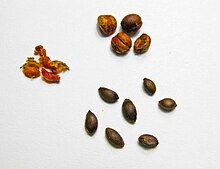Celastrus paniculatus
From Wikipedia, the free encyclopedia

 Celastrus paniculatus is a woody liana commonly known as black oil plant, climbing staff tree, and intellect tree (Sanskrit: jyotishmati ज्योतीष्मती, Hindi: Mal-kangani माल-कांगनी, Chinese: deng you teng 灯油藤).[1][2][3] The plant grows throughout India at elevations up to 1800 m.[1][4] Oil from the seeds is used as a traditional medicine in Indian Unani and Ayurvedic medicine.[1][5]
Celastrus paniculatus is a woody liana commonly known as black oil plant, climbing staff tree, and intellect tree (Sanskrit: jyotishmati ज्योतीष्मती, Hindi: Mal-kangani माल-कांगनी, Chinese: deng you teng 灯油藤).[1][2][3] The plant grows throughout India at elevations up to 1800 m.[1][4] Oil from the seeds is used as a traditional medicine in Indian Unani and Ayurvedic medicine.[1][5]
C. paniculatus is a deciduous vine with stems up to 10 centimeters in diameter and 6 meters long with rough, pale brown exfoliating bark covered densely with small, elongated lenticles. The leaves are simple, broad, and oval, obovate or elliptic in shape, with toothed margins.[1][2] The Intellect tree, or Celastrus paniculatus, is a climbing shrub, also known as malkangani, found throughout India. The seeds contain fatty acids and alkaloids, and have sedative and antidepressant actions. Botanist M. Daniel states that the seeds are used to sharpen the memory, and Ayurvedic practitioners also use the seed oil as a brain tonic and as a treatment for memory loss. A study published in the August 2004 issue of the "Journal of Ethnopharmacology" found that intellect tree's ability to improve memory loss may be due to its neuroprotective actions. A study of rats suggested the aqueous extract of Celastrus paniculatus seed has dose-dependent cholinergic activity, thereby improving memory performance.[6]
References
- ^ a b c d Premila, M. S. (2006). Ayurvedic Herbs: A Clinical Guide to the Healing Plants of Traditional Indian Medicine. New York: Haworth Press. ISBN 0-7890-1768-7.
- ^ a b H. F. Macmillan (1989). Handbook of Tropical Plants. Columbia, Mo: South Asia Books. ISBN 81-7041-177-7.
- ^ Putz, Francis E.; Mooney, Harold A. (1991). The Biology of vines. Cambridge, UK: Cambridge University Press. ISBN 0-521-39250-0.
- ^ Zhixiang Zhang, Michele Funston: Celastrus, in Flora of China, Vol. 11
- ^ Chopra, R. N.. Indigenous Drugs of india. Kolkata: Academic Publishers. ISBN 978-81-85086-80-4.
- ^ Bhanumathy M. Harish MS. Shivaprasad HN. Sushma G."Nootropic activity of Celastrus paniculatus seed.Pharmaceutical Biology. 48(3):324-7, 2010 Mar.
External links
- Caldecott, Todd (2006). Ayurveda: The Divine Science of Life. Elsevier/Mosby. ISBN 0-7234-3410-7. Contains a detailed monograph on Celastrus paniculatus(Jyotishmati) as well as a discussion of health benefits and usage in clinical practice. Available online at http://www.toddcaldecott.com/index.php/herbs/learning-herbs/351-jyotishmati
- http://en.wikipedia.org/wiki/Celastrus_paniculatus
Celastrus paniculatus
| |
|---|---|
Kingdom:
| |
(unranked):
| |
(unranked):
| |
(unranked):
| |
Order:
| |
Family:
| |
Genus:
| |
Species:
|
C. paniculatus
|
Celastrus paniculatus
| |
Celastrus dependens Wall.
| |
No comments:
Post a Comment